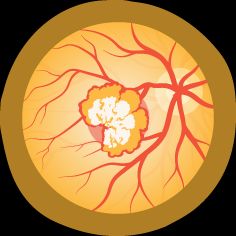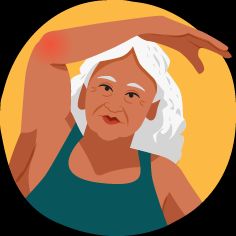-
Health Conditions
Health Conditions
All- Breast Cancer
- Cancer Care
- Caregiving for Alzheimer's Disease
- Chronic Kidney Disease
- Chronic Obstructive Pulmonary Disease (COPD)
- Digestive Health
- Eye Health
- Heart Health
- Menopause
- Mental Health
- Migraine
- Multiple Sclerosis (MS)
- Psoriasis
- Rheumatoid Arthritis (RA)
- Sleep Health
- Type 2 Diabetes
- Weight Management
Condition Spotlight
All-
 Controlling Ulcerative Colitis
Controlling Ulcerative Colitis -
 Navigating Life with Bipolar Disorder
Navigating Life with Bipolar Disorder -
 Mastering Geographic Atrophy
Mastering Geographic Atrophy -
 Managing Type 2 Diabetes
Managing Type 2 Diabetes
-
Wellness
Wellness Topics
All- CBD
- Fitness
- Hearing
- Mental Well-Being
- Nutrition
- Parenthood
- Recipes
- Sexual Health
- Skin Care
- Sleep Health
- Vitamins and Supplements
- Women's Wellness
Product Reviews
All- At-Home Testing
- Men's Health
- Mental Health
- Nutrition
- Sleep
- Vitamins and Supplements
- Women's Health
Featured Programs
All-
 Your Guide to Glucose Health
Your Guide to Glucose Health -
 Inflammation and Aging
Inflammation and Aging -
 Cold & Flu Season Survival Guide
Cold & Flu Season Survival Guide -
 She’s Good for Real
She’s Good for Real
-
Tools
Featured
- Video Series
- Pill Identifier
- FindCare
- Drugs A-Z
Lessons
All- Crohn’s and Ulcerative Colitis Essentials
- Diabetes Nutrition
- High Cholesterol
- Taming Inflammation in Psoriasis
- Taming Inflammation in Psoriatic Arthritis
Newsletters
All- Anxiety and Depression
- Digestive Health
- Heart Health
- Migraine
- Nutrition Edition
- Type 2 Diabetes
- Wellness Wire
Lifestyle Quizzes
- Find a Diet
- Find Healthy Snacks
- Weight Management
- How Well Do You Sleep?
- Are You a Workaholic?
-
Featured
Health News
All- Can 6-6-6 Walking Workout Help You Lose Weight?
- This Couple Lost 118 Pounds Together Without Medication
- 5 Science-Backed Ways to Live a Longer Life
- Morning Coffee May Help You Live Longer
- ‘Weekend Warrior’ Workouts for Your 2025 Fitness Goals
This Just In
- 5 Tips for a Healthy Lifestyle
- How to Disinfect Your House After the Flu
- Best Vegan and Plant-Based Meal Delivery for 2025
- Does Medicare Cover Pneumonia Shots?
- Chromosomes, Genetics, and Your Health
Top Reads
- Best Multivitamins for Women
- Best Multivitamins for Men
- Best Online Therapy Services
- Online Therapy That Takes Insurance
- Buy Ozempic Online
- Mounjaro Overview
Video Series
- Youth in Focus
- Healthy Harvest
- Through an Artist's Eye
- Future of Health
-
Connect
Find Your Bezzy Community
Bezzy communities provide meaningful connections with others living with chronic conditions. Join Bezzy on the web or mobile app.
All-
 Breast Cancer
Breast Cancer -
 Multiple Sclerosis
Multiple Sclerosis -
 Depression
Depression -
 Migraine
Migraine -
 Type 2 Diabetes
Type 2 Diabetes -
 Psoriasis
Psoriasis
Follow us on social media
Can't get enough? Connect with us for all things health.
-
Nutrition
- Meal Kits
- Overview
- Diets
- Meal Kits
- Prepared Meals
- Comparisons
- Grocery Delivery
- Special Diets
- Healthy Eating
- Food Freedom
- Conditions
- Feel Good Food
- Products
- Vitamins & Supplements
- Sustainability
- Weight Management
- Symptoms
- Types
- Diagnosis
- Treatment
- Causes & Risk Factors
- Complications
- Related Conditions
- Prevention
- Diet
Related Hubs

Heart Health
Your hub for heart health management, insights, and solutions
Related Topics
-
Symptoms
SymptomsRelated Articles
- Symptoms
- Symptoms in Women
- Early Warning Signs
- Vertigo
- Arm Pain
- Recognizing Signs
- Right-Sided Facial Numbness
- Symptoms in Men
- How to Notice
- vs. Heart Attack
-
Types
TypesRelated Articles
- Lacunar Stroke
- Types
- Eye Stroke
- Basal Ganglia Stroke
- Left-Sided Stroke
- Ischemic Stroke
- Silent Stroke
- Ischemic vs. Hemorrhagic
- Massive Stroke
- Occipital Stroke
- Embolic Stroke
- Sleep Stroke
- MCA Stroke
- Cryptogenic Stroke
- Hemorrhagic Stroke
- Spinal Stroke
- Cerebellar Stroke
- Thrombotic Stroke
- Brain Stem Stroke
- Thalamic Stroke
-
Diagnosis
DiagnosisRelated Articles
- Diagnosis
- Screening
-
Treatment
TreatmentRelated Articles
- Treatment
- Medications
- First Aid
- How to Stop a Stroke
- Caretaker Guide
-
Causes & Risk Factors
Causes & Risk FactorsRelated Articles
- Cerebral Hyperfusion
- Stroke Level Blood Pressure
- Genetics
- Risk Factors
- Age Range
- Hypertension and Heart Disease
- Not specific to stroke
- Diabetes
- Heart Arrhythmia
- COVID-19
- Stress
- COVID-19 Vaccine
- Low Blood Pressure
- Cerebral Circulation
- Neck Cracking
- Substance Use
- Birth Control
-
Complications
ComplicationsRelated Articles
- Effects on Body
- Speech Recovery
- Seizure
- Dementia
- Post-Stroke Symptoms
- Behavior After Stroke
- Confusion
- Facial Paralysis
- Vision Loss
- Hemiparesis vs. Hemiplegia
- Aphasia
- Hemiparesis
-
Related Conditions
Related ConditionsRelated Articles
- vs. Aneurysm
- vs. Heart Attack
- vs. TIA
- vs. Bell's Palsy
- vs. Seizure
- vs. Migraine
- Migraine with Aura
-
Prevention
PreventionRelated Hub

Prevention and Lifestyle
Tips for a heart-healthy lifestyle
Related Articles
- Prevention
- Natural Remedies
- Avoid Stroke After TIA
-
Diet
Health News
How to Tell If You’ve Had a Ministroke
Experts say a transient ischemic attack (TIA) sometimes doesn’t cause serious health problems, but it could signal a high risk of a stroke.
 Share on Pinterest
Share on Pinterest
How well do you know the symptoms of a stroke?
Data from a new survey led by the American Heart Association and the American Stroke Association indicates that more than one-third of all Americans have experienced symptoms of a transient ischemic attack (TIA) — sometimes referred to as a “ministroke.”
However, only 3 percent of those individuals sought proper medical attention.
Stroke is the fifth leading cause of death in the United States.
A TIA is similar to a stroke, but as its name suggests, it causes only a temporary halt in blood flow to the brain without leading to tissue death (infarction).
Serious effects afterward
While a TIA can occur without causing serious harm, the real danger comes during the period following such an event.
“The risk of stroke during the 90 days after TIA is approximately 10 percent,” Dr. Mitchell S.V. Elkind, a professor of neurology and epidemiology at Columbia University, told Healthline.
However, “The risk is front loaded so that half of that risk occurs during the first 48 hours,” he said.
Many may be familiar with the acronym F.A.S.T. to identify stroke symptoms:
- Face drooping
- Arm weakness
- Speech difficulty
- Time to call 911
However, the signs of TIA are not as easily identifiable.
They include severe headache, dizziness, trouble seeing in one or both eyes, and unexplained confusion.
Despite 35 percent of respondents having reported one or more of these symptoms, most of them (77 percent) had never heard of TIA.
“We know that only 2 to 3 percent of the population has had a physician-diagnosed TIA,” Elkind said. “So the fact that 35 percent in this survey had symptoms consistent with TIA suggests that there is a lot more TIA out there than we had thought.”
The specific symptom of a TIA is also important, as some may be better indicators of a subsequent stroke.
Dr. Joseph Schindler, the clinical director of the Yale New Haven Stroke Center, told Healthline, “Studies have shown that TIA patients who experience language impairment and motor weakness may be at a higher risk for stroke in the near future.”
Read more: More Hispanic participants needed in stroke research »
Higher risk for certain ethnicities
Another important finding from the survey is that TIA risk is disproportionately higher for African-Americans and Hispanics than it is for Caucasians.
Stroke risk is nearly double for African-Americans and they are also more likely to die following a stroke.
Similarly, Elkind says that African-Americans and Hispanics are less likely to have heard of TIA or be able to identify at least one symptom.
“These minority groups are both more likely to have had the symptoms of a TIA and less likely to seek help — a potentially very dangerous situation,” he said.
Seeking help quickly
While TIA may not cause any permanent damage at the time of occurrence, it is still essential to seek medical attention, even if the symptoms don’t seem serious.
Strokes are preventable, but timing is key.
People brought to an emergency room within the first three hours of experiencing symptoms have significantly better outcomes than those who arrive later.
Paying attention to TIAs can potentially give you an advantage in identifying a stroke before it happens.
“A TIA can be a blessing in disguise because it sends a warning that something isn’t right so you can hopefully stop a stroke before it ever happens,” said Elkind.
“If you or someone you know does have a sign of TIA or stroke, the most important thing to do is get help right away,” he added “Stroke is largely treatable thanks to medical advancements like a clot-busting drug and medical devices like stent retrievers. The key to getting treatment is getting help in time.”
Share this article
related stories
-
Everything You Need to Know About Stroke Recrudescence
Read this next
-
Depression After a Stroke: What to KnowMedically reviewed by Matthew Boland, PhD
Post-stroke depression is common. Here's all you need to know.
READ MORE -
Understanding Pediatric Stroke: Causes, Treatment, and RecoveryMedically reviewed by Carissa Stephens, R.N., CCRN, CPNREAD MORE
-
Child-Like Behavior and Other Personality Changes After a StrokeMedically reviewed by Heidi Moawad, M.D.
A stroke can damage parts of the brain, which can in turn cause changes to someone's personality. Keep reading to learn why and important…
READ MORE -
Everything You Need to Know About Stroke RecrudescenceMedically reviewed by Nancy Hammond, M.D.
It's not uncommon for the symptoms of a stroke to reoccur, even years after the initial stroke. However, it can be hard to tell this from a new stroke.
READ MORE -
What Is a Perinatal Stroke?Medically reviewed by Heidi Moawad, M.D.
Perinatal strokes occur shortly before or shortly after birth. They can cause side effects that linger throughout life and sometimes death.
READ MORE -
What Is a Basilar Artery Stroke?Medically reviewed by Nancy Hammond, M.D.READ MORE
-
She Had a Stroke at 39. Her Uncommon Symptoms Delayed Treatment
Because the symptoms she experienced weren’t what she considered common, Jenna Gibson and her family didn’t realize she was having a stroke when it…
READ MORE -
Regaining the Ability to Walk After a Stroke: How Long Does It Take?Medically reviewed by Amy Elizabeth Wolkin, PT, DPT, MBAREAD MORE
-
Overview of Pontine Stroke READ MORE
- About Us
- Contact Us
- Privacy Policy
- Privacy Settings
- Advertising Policy
- Health Topics
- Sitemap
- Medical Affairs
- Content Integrity
- Newsletters
-
© 2025 Healthline Media LLC. All rights reserved. Healthline Media is an RVO Health Company. Our website services, content, and products are for informational purposes only. Healthline Media does not provide medical advice, diagnosis, or treatment. See additional information.
OUR BRANDS
HealthlineMedical News TodayGreatistPsych CentralBezzy